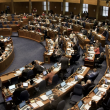Bismarck, North Dakota – After a campaign that was largely funded by an outside term limits group and supported locally by far-right conservatives, North Dakota voters on Tuesday approved term limits for their governor and state legislators.
The referendum amends the state constitution to add a provision restricting lawmakers to eight years in the state House and Senate. There was a two-time limit on the governor’s election.
Supporters said that the proposal will enhance voter turnout and bring in more fresh faces. A frequent turnover would reduce institutional expertise and shift influence to lobbyists, agencies, and the governor, according to opponents of term limits, who claimed that they constitute an assault on the electorate’s freedom to select the candidates they prefer.
Many lawmakers, both Democrats and Republicans, have spoken out against the proposal. Gov. Doug Burgum, a Republican, backed it.
U.S. The Washington, D.C.-based group Term Limits, whose Florida-based leader has donated to libertarian presidential candidates, made more than $810,000 in the previous two years to get the ballot initiative before voters. Term Limits seeks to impose term limits on all elected officials. According to campaign finance disclosure documents, opponents of the bill have raised slightly over $40,000 to fight the idea, with numerous contributions coming from Republican lawmakers.
A number of legislators affiliated with the ultraconservative Bastiat Caucus in the Legislature as well as numerous new GOP district chairmen make up the measure’s sponsoring committee. In addition to the donations from the out-of-state group, it raised about $45,000.
Professor of agriculture at North Dakota State University in Fargo and self-described independent Brooke Thiel, 35, voted against the proposal. She claimed that the majority of MPs simply try to sort things out during their first terms, and that once “things get clicking” during their second terms, she might want to vote for them once more.
A 25-year-old nurse named Meghan Friese cast her early ballot in Bismarck in favor of term limits. She claimed that long-time leaders are too challenging to unseat.
“Familiarity keeps them there,” she said.
The new rules will go into effect on January 1st, but they won’t be retroactive, so the time spent in office by present officials won’t count against the limitations.
There are term restrictions for legislators in 15 states and for governors in 36 states.











